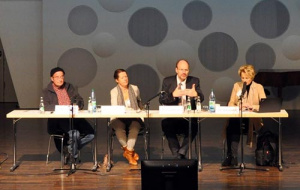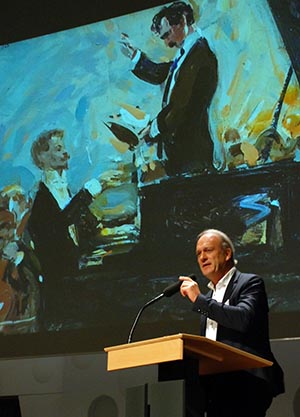A musical symposium
 Old Members’ Trust Graduate Conference and Academic Travel Grant Report – Anna Wiedemann
Old Members’ Trust Graduate Conference and Academic Travel Grant Report – Anna Wiedemann
18th Symposium of the German Society for Music Physiology and Musicians’ Medicine
From 15 to 16 November 2019, I attended the 18th Symposium of the German Society for Music Physiology and Musicians’ Medicine at the University of Music “Carl Maria von Weber” in Dresden to present a poster of my research on music performance anxiety.
The annual symposium of the German Society for Music Physiology and Musicians’ Medicine offers the opportunity for a lively exchange with experts in the field and brings together medical doctors, psychologists, physiotherapists, performers, and teachers to discuss new research ideas and questions. The symposium in Dresden was devoted to medical and psychological challenges encountered by music students throughout their degree. Interdisciplinary panel discussions about pain disorders, voice disorders, or mental health concerns in this cohort formed the core element of the first day of the conference. This was followed by the poster presentations and various workshops discussing neurological conditions, general fitness, and interdisciplinary performance approaches including dance therapy on day two. During the two days, the society also celebrated its 25th anniversary featuring keynote speaker Prof. Jochen Blum from the Institute for Music Physiology and Musician’s Medicine at the Frankfurt University of Music and Performing Arts.
 My presented poster focused on music performance anxiety (MPA) in music students. MPA is considered a special form of emotional behaviour involving a variety of aspects such as a trembling or shaky voice, a rapid heart rate, feeling tense, helpless or inadequate, experiencing memory problems, insomnia, or avoidance reactions. Whilst a certain degree of arousal is often necessary for an optimal performance, excessive levels of MPA will almost certainly impair performance quality. At the moment, severe MPA is considered a social anxiety disorder. Recent conceptualisations, however, challenge these existing definitions, distinguishing MPA from social anxiety.
My presented poster focused on music performance anxiety (MPA) in music students. MPA is considered a special form of emotional behaviour involving a variety of aspects such as a trembling or shaky voice, a rapid heart rate, feeling tense, helpless or inadequate, experiencing memory problems, insomnia, or avoidance reactions. Whilst a certain degree of arousal is often necessary for an optimal performance, excessive levels of MPA will almost certainly impair performance quality. At the moment, severe MPA is considered a social anxiety disorder. Recent conceptualisations, however, challenge these existing definitions, distinguishing MPA from social anxiety.
In collaboration with the Technical University in Dresden and the University of Aberdeen, we recruited 82 music students and tested them for anxiety-related symptoms using the disorder-specific anxiety measures of the DSM-5, the current manual for assessment and diagnosis of mental disorders. We found no evidence of MPA being primarily connected to social anxiety. Instead, generalised anxiety acted as full mediator between the two as well as between MPA and any other anxiety type such as separation anxiety, or panic disorder. Our findings were valid regardless of the attention being restricted to severe levels of MPA. This means, in more general, our findings support the idea of MPA being distinguished from social anxiety.
I am extremely grateful for the support of the Old Members’ Trust which enabled me to present my research at the 18th Symposium of the German Society for Music Physiology and Musicians’ Medicine, and take part in interdisciplinary discussions with leading experts in the field.
A copy of the poster can be found at researchgate.net
If you are interested in reading more about this research, you can also read the recently published Preprint on PsyArXiv or attend the Martlets Society on 12 February 2020 where Anna will give a talk about this topic. The talks are hosted by Lady Crewe and start at 8.30 pm in the Master’s lodgings, with drinks and snacks on offer from 8pm.
Find out more about the range of travel grants and scholarships available to assist Univ students on our Travel Grants page or read further travel reports.
Image © Institute for Musicians’ Medicine, University of Music “Carl Maria von Weber” Dresden, Nov. 2019.
Published: 28 January 2020
Explore Univ on social media
